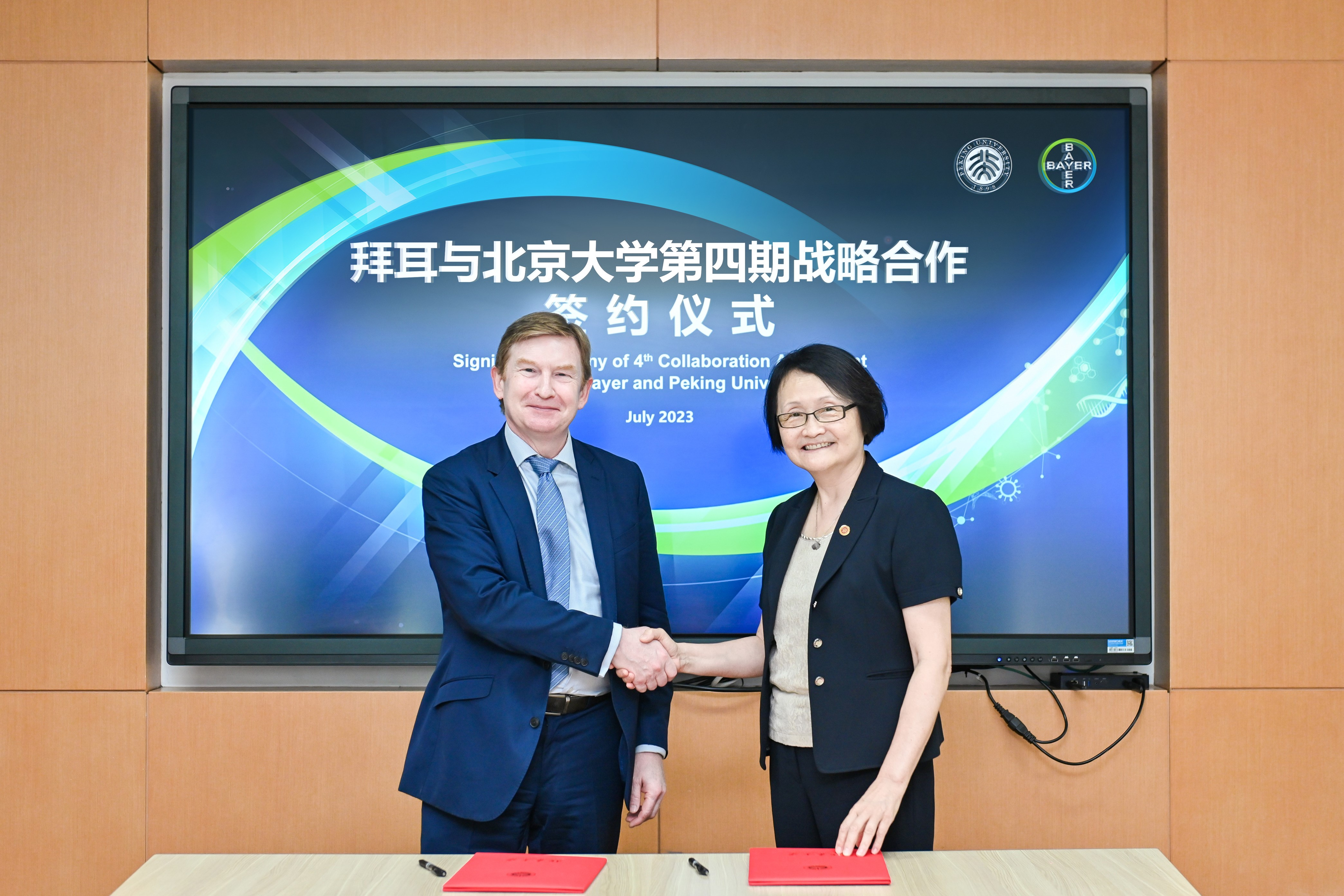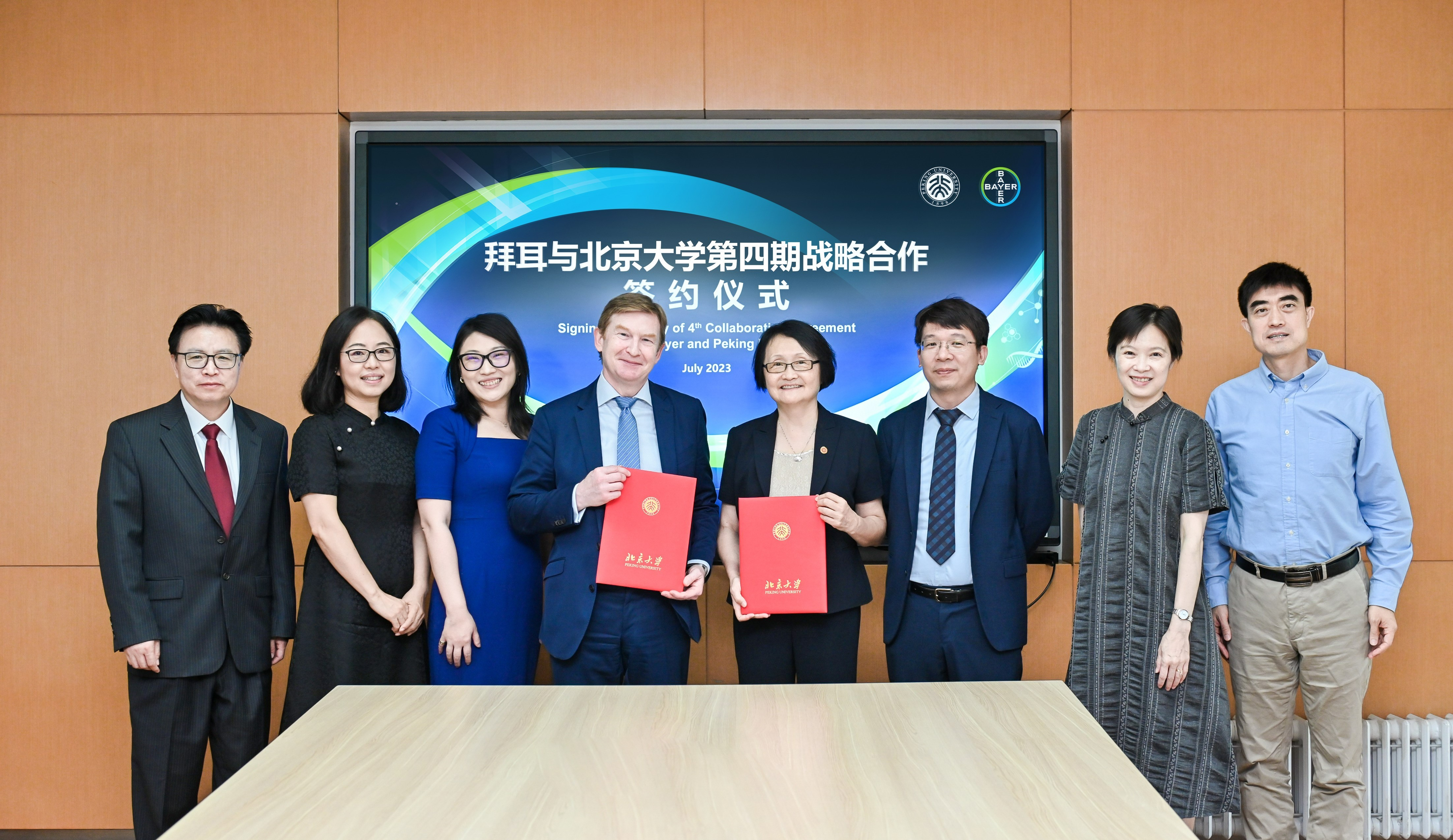Peking University, July 11, 2023: Peking University (PKU) and Bayer recently signed the 4th collaboration agreement, aiming to further foster the translation of basic research into drug discovery and development, while accelerating scientific research on cutting-edge technologies across drug R&D value chain.
The collaboration is to focus key selected areas of interests, which are currently oncology, cardiorenal, immunology, as well as cell and gene therapy. Under the agreement, Bayer will continue funding support to joint research projects, as well as to scientists at PKU in recognition of their research excellence in life sciences and drug innovation.
Bayer and PKU signs the 4th collaboration agreement for strategic partnership. (Photo credit: Bayer)
In 2014, Bayer and PKU established a strategic academic partnership and founded a joint research center at Peking University to advance the translation of drug discovery and research, by which Bayer provided funding support for the joint research projects. The collaboration agreement was renewed in 2017 and 2020 respectively. The latest agreement renewal marks the fourth consecutive three-year period of the strategic partnership.
“We look forward to a new chapter of the partnership between Bayer and Peking University moving forward,” said Dr. Friedemann Janus, Acting Head of Business Development & Licensing and Open Innovation, Bayer Pharmaceuticals. “This partnership reflects Bayer’s consistent commitment to China as we see more exciting and disruptive innovation coming from China. We will continue to reinforce our collaboration with Peking University and to explore open innovation models. These could translate scientific breakthroughs into innovative treatments, thus making a meaningful impact to lives of patients.”
“Peking University has been actively integrating internal and external resources and undertaking the important task of scientific and technological innovation through discipline construction and personnel training. Since 2014, Peking University has carried out innovative research collaborations with Bayer with fruitful results achieved. I look forward to working together with Bayer to promote the development of life sciences and medical technology, to achieve a win-win situation for both academia and industry, and to ultimately benefit patients in China and around the world,” said Wu Hong, Chair Professor of School of Life Sciences at Peking University and Senior Investigator of Peking-Tsinghua Center for Life Sciences.

Over the past nine years, Bayer and PKU have conducted a total of 26 joint research projects and published seven co-authored papers in internationally renowned academic journals. As the latest outcome of the collaborations, the result of joint research led by Dr. Helge G. Roider from Bayer and Prof. Zhang Zemin from the PKU was published in Genome Biology in December 2022, with the article entitled “Parallel single-cell and bulk transcriptome analyses reveal key features of the gastric tumor microenvironment.”
In addition to joint research collaborations, Bayer Endowed Chair, Bayer Investigator and Bayer Postdoc have been founded under the partnership to recognize and support distinguished scholars who have outstanding scientific achievements in life sciences and drug innovation. Prof. Gao Ning, Prof. Xiaoliang Sunney Xie, Prof. Yu Xiang, Prof. Gai Feng and Prof. Chen Xuemei from PKU have been honored as Bayer Endowed Chair.
Academic collaborations have been an integral part of Bayer’s long-standing commitment on fostering drug innovation originated in China and the translation of drug discovery and research. In 2009 and 2014, Bayer established strategic collaborations with Tsinghua University and Peking University respectively. As of June 2023, Bayer and the two prestigious universities have carried out a total of 99 joint research projects, including discovery and structural analysis of novel targets, pathogenesis and drug mechanism of action research, drug screening, efficacy evaluation as well as exploration on new modalities, new synthetic methods and innovative formulations.
About Collaborate to Cure Hub China within BD&L and Open Innovation at Bayer Pharmaceuticals
Bayer’s Collaborate to Cure Hub China was established in 2022. The hub’s team is fully dedicated to developing regional business development strategy and driving key partnering initiatives and deal making as well as managing strategic alliances covering both commercial and academic collaborations for Bayer Pharmaceuticals in China. As an integral part of Bayer’s partnering network worldwide, the team is committed to strengthening connection with China innovation ecosystem and collaborations with local stakeholders and partners, including biopharma, biotech companies, start-ups as well as universities and research institutions. Its experts focus on scouting local innovation across the entire value chain of drug innovation, exploring partnering opportunities and facilitating deal making.
About Bayer
Bayer is a global enterprise with core competencies in the life science fields of health care and nutrition. Its products and services are designed to help people and the planet thrive by supporting efforts to master the major challenges presented by a growing and aging global population. Bayer is committed to driving sustainable development and generating a positive impact with its businesses. At the same time, the Group aims to increase its earning power and create value through innovation and growth. The Bayer brand stands for trust, reliability and quality throughout the world. In fiscal 2022, the Group employed around 101,000 people and had sales of 50.7 billion euros. R&D expenses before special items amounted to 6.2 billion euros. For more information, go to www.bayer.com.
Edited by: Dennis Meng
Source: School of Life Sciences, Bayer

